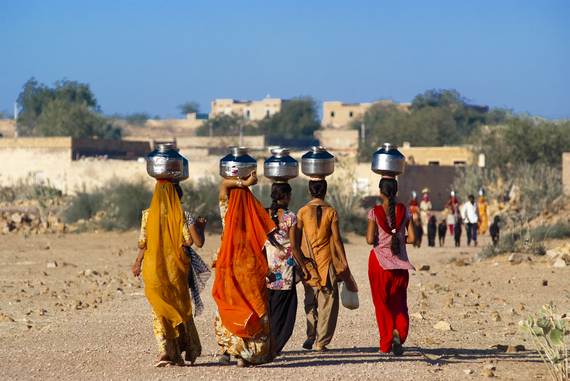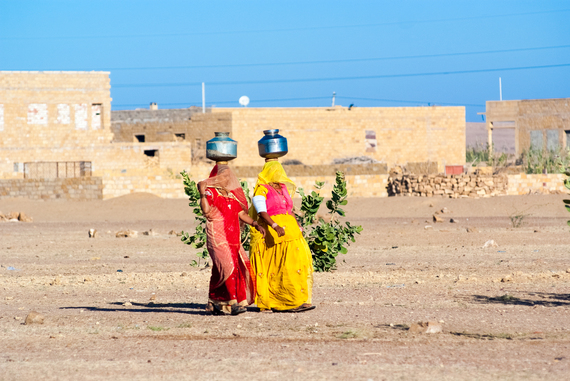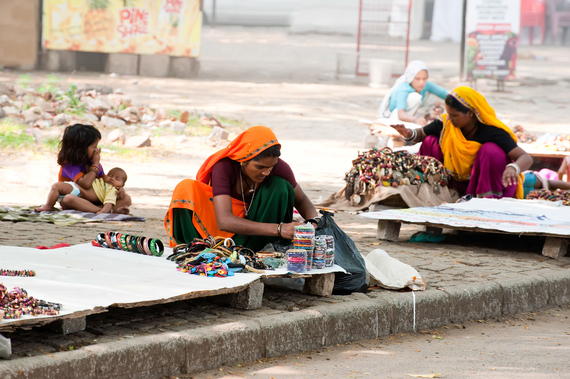"What do I think about India's Daughter?" repeated my second generation British-Indian friend over skype while his own 6-year-old daughter relentlessly tugged at his headset. "About the film? About them refusing to air it in India?" he added with growing agitation as his daughter pulled harder on the chord. "Wait," he said, succumbing to the demands of his princess, "Gonna find her mum. Back in a few." That said, he transformed his speaking voice into a helicopter sound, lifted his daughter over his head, told her to wave bye-bye to the silly man and hung up.
Having spent nearly a decade working for the BBC, my friend, undoubtedly, had profound insights on recent events. It would only be a matter of time before he'd call back. Not only were his parents born in India but they still had remote family living in New Dehli. Since the two of us had worked on TV show treatments that dealt with relatively touchy subject matter, I knew there was little we weren't able to discuss. Who was I kidding; I was an idiot for calling. I had become the self-conscious white guy who calls the one black colleague he knows to say "must be hard with all that Fergusson stuff going on." Worse still, I was suddenly that weird gentile neighbor my family had spoken about, the one that once told my grandfather, "congratulations on that Schindler's List thing" after learning that he was a holocaust survivor.
As many are aware, India's Daughter, a documentary by British filmmaker Leslee Udwin, recently aired on BBC's Storyville. It was subsequently broadcast in Denmark, Sweden, Switzerland, Norway and Canada as part of International Woman's Day, while also enjoying a U.S. premier in a special star-studded gala hosted by Meryl Streep. Tellingly, it was banned from airing in India proper. Depicting the brutal 2012 Delhi gang rape of a graduating medical student Jyoti Singh, the film deals with both the incident as well as the sociopolitical aftermath. The reason cited for the ban by the Indian government is, "it was likely to cause a breach of law and order." In response, New Delhi's NDTV -- the station slated for broadcast -- courageously joined the indignant masses and showed a blank screen for the duration of the intended program. In the end, more Indians ended up watching the film via the Internet than would likely have seen it under normal circumstances.
Catharsis for Many Nations
The level of brutality involved in the 2012 abduction, rape and sadistic sexual assault of Jyoti Singh was gruesome enough to warrant a public outcry. What began as a protest with lynch mob overtones soon gave way to a more poignant type of demonstration. The people had had enough. They were demanding genuine social reform. While state justices had opted for death penalty convictions for four of the six perpetrators (the fifth having committed suicide in prison while the sixth -- incidentally, the most violent -- was a minor), most Indians were looking for a different kind of response. Veering away from cries for vengeance, local youth was calling for sober reflection on misogyny and violence. They wanted a paradigm shift in India's patriarchal society, something that would thwart the number of rapes in the future. India was sending the world a message: the plight of women would no longer be ignored.
Jyoti soon became a symbol not for victimhood but for never giving in. She was the girl from the poor family who wanted to become a doctor at all costs, the girl who was lucky enough to have parents who. against the recommendations of extended family, had sacrificed everything to ensure that their daughter could complete her studies. In a country where sweets were handed out at the birth of a boy, while the birth of a girl was greeted with condolences, Jyoti's was a family that fostered their daughter's sense of self-worth.
Along with the martyred Jyoti, there stood a new generation of both women and men -- youths who felt that women shouldn't have to account for their desires, ambitions, dress codes and behavior any more than men did. As the crowds grew, so did their ambition. People of all ages came together to let their government know that everyone had the right to dream boldly and take on the future as they saw fit. Helplines were started, women prosecutors were appointed onto the government counsel, sexual assault cases were fast-tracked, sex-offenders were meted out harsher penalties, boards were appointed to review women's safety in different regions of the country, and - for the first time in India's history - women were officially encouraged to report rapes. Being a victim was nothing to be ashamed of. The nation was being reborn. It was this activism, rather than the rape that inspired Leslee Udwin's film project.
Rules of Engagement
As viewers, we have long been desensitized by the perpetual onslaught of coverage devoted to serial killers, war criminals, and run-amok terrorists. The truly shocking part of India's Daughter is not the rape in all its gory detail, but the comments made by otherwise respected members of India's democratic society. Since contemporary India is neither a medieval nation nor a militant fundamentalist theocracy where ancient superstitions dictate law, it is hard to believe some of the opinions being voiced. It soon became abundantly clear that despite her democratic legal system, India, like many other countries in the world, suffered from deeply imbedded prejudices when it came to women. The justifications given for the rape, by defendants as well as their lawyers, connoted a nastier malignancy than the tragedy itself.
Each justification told us: Rape is not an aberration but simply the rule (albeit carried out with a primitive lack of restraint); rape is not something in opposition to culture but something in harmony with our antiquated definitions of women as temptresses; and rape, to put it bluntly, is something our abhorrent civilization condones in spirit even though it recognizes that it can no longer allow it in practice.
The law may say rape is wrong, but the law reflects our good taste more than our natures; the law is our ambition rather than our state; and the law is no more than an enforced Utopian myth that runs contrary to our terrible tradition. If one were a reporter from another planet interviewing the respected Indian defense lawyers, it would be easy to conclude that freedom, democracy and equality are no more than adopted superstitions that have been painstakingly superimposed on our otherwise barbaric world.
Casual Cruelty
Judging by the prison interview, Mukesh Singh considers himself less a violent rapist than a well-meaning vigilante who got carried away. Consider his psychotic justification for rape: "A decent girl won't roam around at nine o'clock at night. Housework and housekeeping is for girls, not roaming in discos and bars at night doing wrong things, wearing wrong clothes.... (we) had to teach them a lesson." Although, he is clearly trying to justify his misogynistic tendencies with distorted logic, there is a peculiar matter-of-factness to his explanations - a nonchalance so out of step with the results that one is easily reminded of Hanna Arendt's concept about the banality of evil. Taken at face value, Mukesh is a very ordinary young man, one who has convinced himself that all he did was "set her straight" in accordance with some value system that contemporary society no longer officially endorses. And, although present laws may have abandoned him, Mukesh is a dutiful misogynist performing the rites of rape.
What went wrong according to Mukesh was simply that "When being raped, she shouldn't fight back. She should just be silent and allow the rape." He further insists that had the victim simply submitted to 'proper rape protocol,' the dutiful rapists would have dropped her off after the event and only hit her boyfriend. He warns society that invoking the death penalty will only make it more dangerous for girls since it will mean that in the future rapists can no longer rely on the victim's common sense to remain silent about their 'rightful punishment'; instead, they will have to kill them for fear of being reported. By way of a summation: "A girl is far more responsible for rape than a boy," the science being: "only about 20% of girls are good" - these 20% being those who aspire to nothing, remain at home and do what they are told.
To those who would accuse Mukesh Singh of being disingenuous, suspecting that his words are born of denial or from an urge to be vindicated of intentional malice aforethought, I would urge them to turn to the comments of his defending lawyer whose mindset reflects a similar worldview. Rather than making a case for his client based on early hardships, indigent lifestyle, or psychological profile, the attorney ML Sharma sees fit to explain the events that transpired as the natural outcome of Jyoti's own wanton behavior. Jyoti had, after all, gone to see the Life of Pi with a male friend earlier that evening. Or to use Sharma's words in the documentary, "(she) left our Indian culture. They were under the imagination of film culture, in which they can do anything".
The idea that a girl (Jyoti) and a boy (her friend, Avanindra Pandrey) could be out for an innocent night of fun was preposterous. Opposite gender friends was a myth perpetuated by Americans. As Sharma says, "You are talking about man and woman as friends. Sorry, that does not have a place in our society. A woman means I immediately put the sex in his eyes."
Overhead Underfoot
Just in case we miss the point, Sharma explains that Jyoti and her family were begging for trouble from the very beginning: "she should not be put on the streets just like food." Quick to supply us with a better culinary metaphor, Sharma moves on to a more specific food group, "Suppose you have box of sweets and you keep them in front of your house. What will happen? Street dogs will come and finish it off. But if you keep the same box of sweets in your fridge, will the street dogs be able to finish it off?"
In Sharma's estimation, Jyoti should probably have remained in the fridge. It is Jyoti and her family who, in allowing her to leave the house, are to blame for the catastrophic event that followed. By way of further illustration, Sharma distinguishes Jyoti, 'one who has lost her honor', from the 'worthy female': "The 'lady' are more precious than a gem, than a diamond. It is up to you how you want to keep the diamond in your hand. If you put your diamond on the street, certainly the dog will take it out. You can't stop it." For all the mixed metaphors, our attorney makes it abundantly clear that the fault is not with the rapists but with the victim.
JP Singh, another defense attorney, concurs, "If very important, very necessary, she (Jyoti) should go outside but only with their family members like uncle, father, mother, grandfather, grandmother etc. She should not go into the night hours with her boyfriend."
Sharma again: "In our society, we never allow our girls to come out from the house after 6:30 or 7:30 or 8:30 in the evening with any unknown person." By unknown person the lawyer is again referring to Avanindra who in all fairness had - at least for several weeks - been less an unknown than someone who had been beaten beyond recognition.
"Nature is only perfect", claims ML Sharma, "Nature has made women innocent, tender like a flower, and physically weak." Throughout his extensive monologues Sharma sees women in two possible ways -either as unsullied gems/flowers/sweets or as spoiled goods. His is a world of virgins who are on their way to becoming either mothers or whores. Either a woman remains under lock and key, cloistered in a parent or husband's home - in which case she soars overhead - or she has resigned herself to being trampled underfoot.
Consensual Rape
Going onto the particulars of the indictment, Sharma clarifies precisely where he stands on the issue, "Rape is the last stage. First stage is excitement, second is the circumstance, third stage is the consent of the girl and the final is rape." In other words, all rape - which by definition means sex consummated against the will of a partner -- is actually done with consent (even if the one consenting has no idea she's doing so). How does Sharma reach this brilliant conclusion? Because "No man can have sex with another woman, against his own will. Unless he gets excited, he can't have sex with a woman. You can ask psychiatrists, doctor or any scientist." Although it's not quite certain what his touted psychiatrists would make of his highly developed brand of misogyny, there are likely a bunch of doctors and scientists that could remind Sharma that sexual arousal is possible without any "teasing" on the part of the victim. Sadly what Sharma is saying is all too familiar: since men need to be sexually aroused in order to rape, all raped women must have unwittingly done something to turn them on.
Here's a lawyer defending a rapist who participated in one of the most vile rapes in recent record -- one wherein a rusty L-shaped iron rod (I feel the details are necessary in this case) shredded the insides of the victim to the point that doctors could no longer distinguish one part from another -- and he insists that rape is not an act of violence with a clear perpetrator and victim but a sexual act where both parties are equally responsible. Living in his own reality with his very own statistics, he goes on to claim that, "All the (rape) cases that come in the courts these days, 90 percent of them are fake. And the other 10 percent, they have to prove it. You have to see if the girl put herself in the circumstances."
Sharma's bottom line is, "The circumstances for rape are created by you. And then when something bad happens, you become the victim -- when in fact you're equally responsible for it.... Everyone is responsible for their own safety. If someone roams around irresponsibly then they have only themselves to blame if something bad happens to them."
Although I am not quite certain how Sharma would explain the recent gang rape of a 71-year-old nun in Eastern India, it's fair to say that - using his rule of thumb - there must have been quite a bit of subliminal enticement and provocative posing going on.
As for what the other lawyer Singh learnt from the tragic death of Jyoti: "If my daughter or sister engaged in pre-marital activities and disgraced herself and allowed herself to lose face and character by doing such things, I would most certainly take this sort of sister or daughter to my farmhouse, and in front of my entire family, I would put petrol on her and set her alight."
India's Daughter & Our World's Ignorant Sons
As the global statistics on rape rolled out with the film's closing credits, I understood that the real subject of India's Daughter was not Jyoti or, for that matter, anyone's daughter; nor was about the many daughters of a country like India; instead, the main subject was all the world's ignorant sons - those who try to justify violence against women, those who see rape merely as sex gone awry.
When it came to age-old misogyny and inequality towards women, it existed everywhere and only the degree to which it was tolerated varied. Our response to rape victims is as good a gauge as any in determining how a given society values 'the other.'
While the level of misogyny condoned by Sharia law in countries like Somalia and the Sudan - where women are sometimes stoned for having been rape victims - may be illegal in secular societies like India, there are, nevertheless, many well-educated public figures in India who share the very same barbaric principles. The fact that they can't act on them is not thanks to their conscience or values but thanks solely to the benefit of having a secular state with a democratic legal system. Though Indian law punishes the rapist, respected legal sources continue to blame the victim -- their vehemence echoing the most repressive patriarchal theocracies.
As for our Western countries, we are not immune from the same bigotry and prejudice. Although our laws and our establishment have learnt to say all the right things publicly, many of us are, likewise, plagued by misogynistic sentiments. Think of every time you've come across phrases such as "the way she dresses, she's just begging for it," or "How was I to know she really meant no when she was acting like that," or "If she didn't want it to happen, why'd she go there alone in the middle of the night?" It's not difficult to see why our society has its own daughters to worry about.
Listening to Sharma self-assuredly proclaim, "We have the best culture," only to be followed by "In our culture there is no place for women." I couldn't help but wonder how the very same people who are proudest of our own culture are often the ones who care little for the rights of others in it. Ensuring that women are not raped, date-raped, sexually harassed, or subject to domestic abuse is the best lesson we can learn from India's daughters.
After a few hours, my British-Indian friend did finally call back. His wife having gone out with friends, his daughter and younger son having gone to sleep, he was free to talk. "So what were we saying? India's Daughter, right? Yeah, sickening stuff. Luckily my parents missed it; otherwise they'd be all up in my face worried for the next 20 years every time my daughter left the house. We've got our share of sick fucks here too you know. Of course, when it comes to my baby girl, judging by her temperament, she'll probably be running her own business any day now; and, if the dynamics are anything like they've been, my son will be working for her at minimum wage."
It was easy to note just how conscientiously my friend had worked to cultivate his daughter's self-esteem. Even when she wasn't present, I could see her hovering over his head as though he were still holding her aloft while making the helicopter sound.
As my friend hung up the phone, all I kept thinking about was Jyoti - how her image had once hovered over her mother and father's head, and how her absent future now dangled over us all like a perpetual question mark waiting to be answered.
By Rory Winston
Rory Winston is a published author/poet/playwright/TV comedy writer/columnist who serves as the Feature & Art Editor for the NY Resident Magazine.




